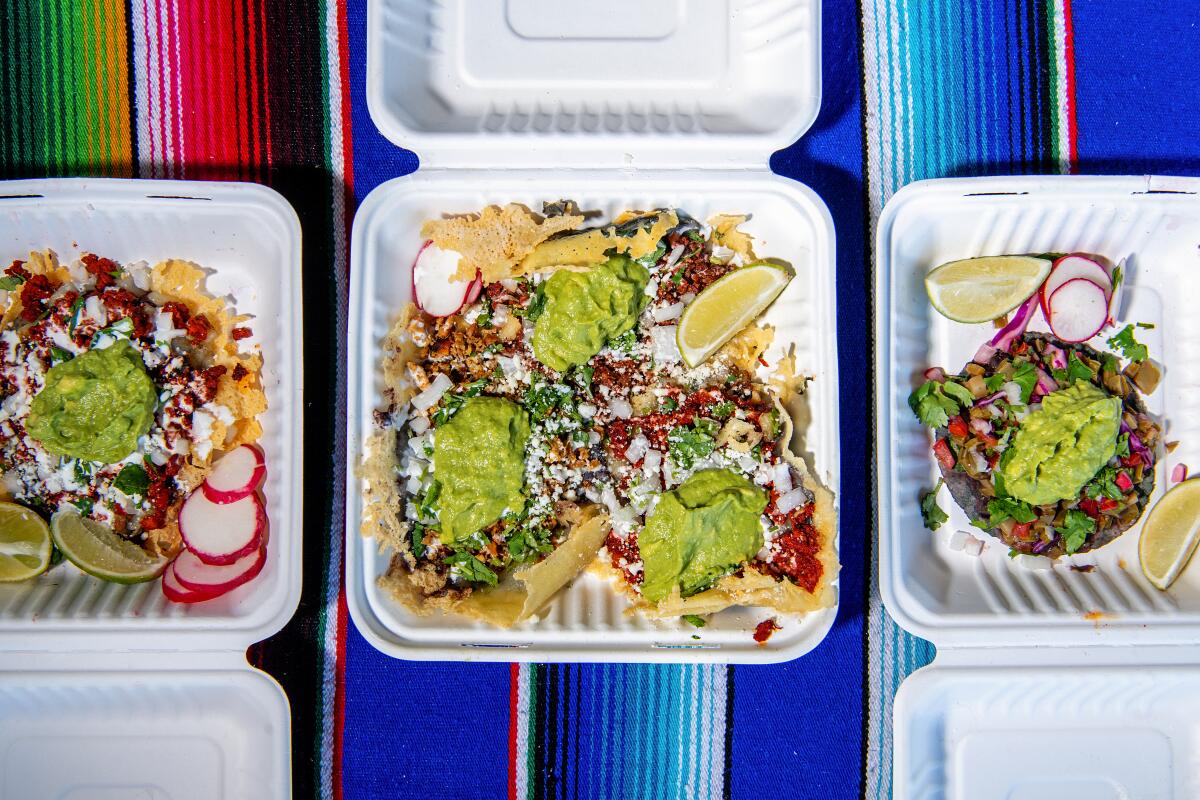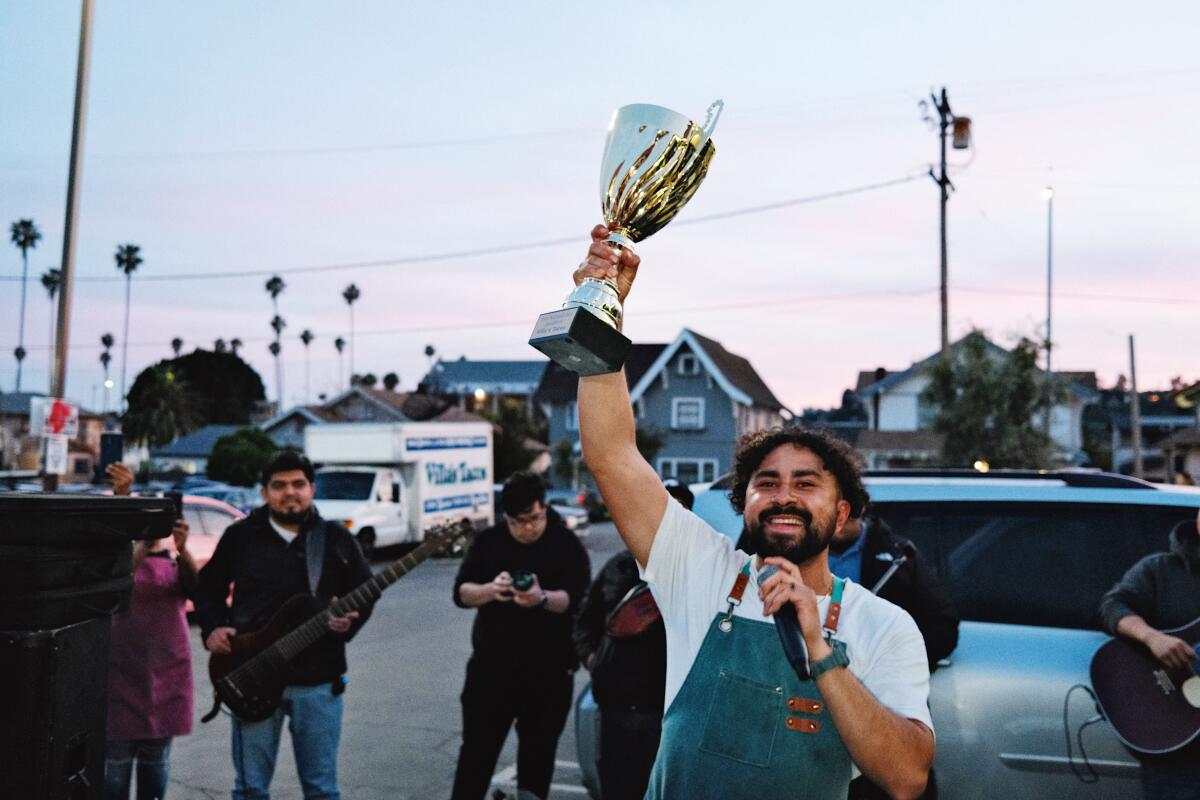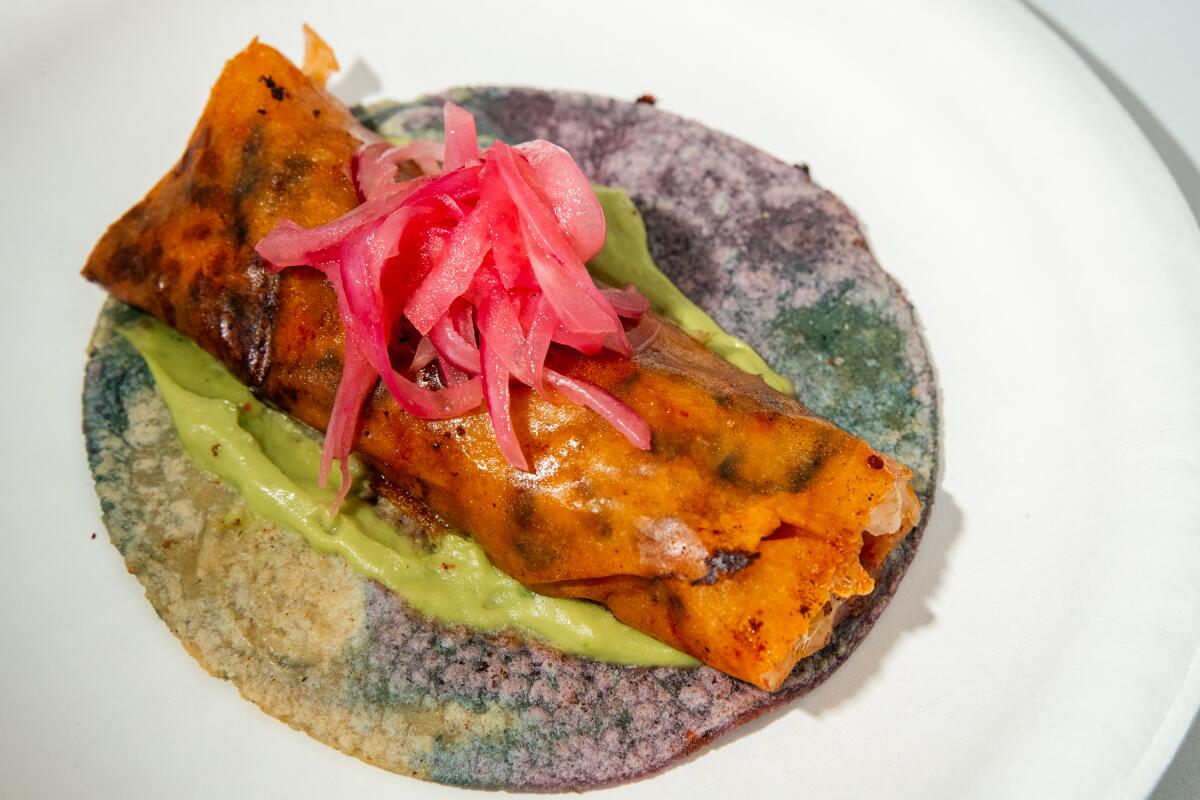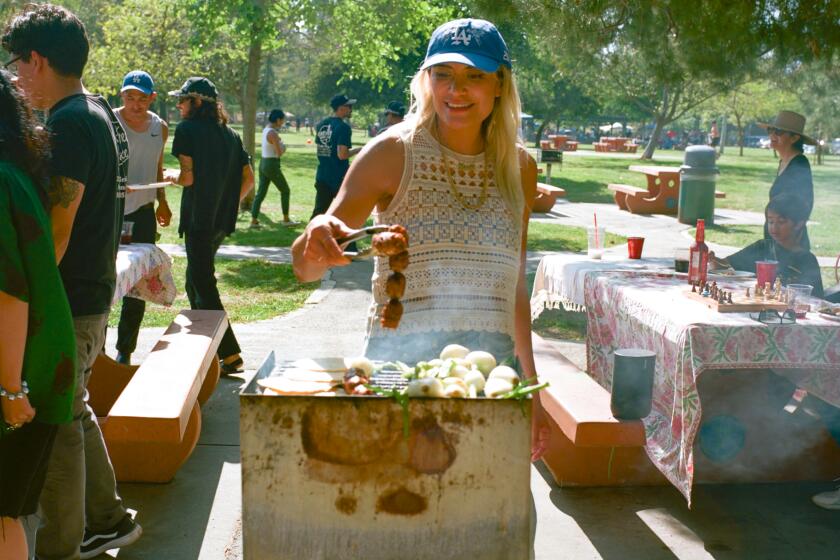‘L.A. Taco deserves to be alive forever.’ Taco Madness fest marks 11th-hour fundraising

- Share via
On a Wednesday night in April taquero Victor Villa was chugging beer from a large gold trophy cup. A crowd gathered to help celebrate.
Surrounded by fans and a sierreño band, the owner of Highland Park’s Villa’s Tacos had just taken home L.A. Taco’s annual Taco Madness award. The independent news site bestows the coveted local honor after compiling reader votes for weeks in a tournament-style bracket. Competition is fierce and underscores the impact that L.A. Taco has on the community.
Its influence is felt all the more urgently this year as L.A. Taco’s staff calls for new membership subscriptions and donations amid a funding crisis.
“L.A. Taco’s going through hard times right now, and we’re here to help them through those hard times,” Villa said during his acceptance speech. Typically the trophy is awarded during the Taco Madness festival, but because of heavy rains and the publication’s financial woes, the event was postponed until Saturday. During the impromptu trophy ceremony, held in the parking lot of Villa’s restaurant, the appreciation for L.A.’s tacos — and L.A. Taco — flowed freely.

There’s nothing quite like the all-in experience of Victor Villa’s queso tacos, made in a style that epitomizes the L.A. dreamer, the go-getter.
“I hope you guys can support L.A. Taco, I hope you guys subscribe to be a member or donate to them,” Villa told the crowd. “Good journalism like L.A. Taco deserves to be alive forever and ever — so this drink is for Highland Park, this drink is for all of Los Angeles, and this drink is for L.A. Taco.”
The James Beard Award-winning publication planned to publicly share that it had run out of money after the annual food festival, but when the rain delay caused a postponement, it forced editor in chief Javier Cabral’s hand. On April 11 Cabral took to social media: L.A. Taco was out of money and facing layoffs.
The local outlet dedicated to city news, cultural criticism and essays, food guides and all things tacos would need 5,000 new paying members — with subscriptions ranging from $5.95 to $19.95 per month — before the end of April. Three of its four full-time staff, not including Cabral, would be furloughed in the interim.
Southern California has always been an ossuary of failed publications done in by apathetic readership, clueless owners or a combination of both. But a new generation of journalists is forging ahead.
An immediate show of new subscribers and support helped cut the team’s furlough short, bringing its full-time staff back at least for two weeks at a time. A boom in merchandise sales — the most the company has ever sold, Cabral said — also helped the team. But they are by no means in the clear, staff said.
On Thursday one anonymous donor offered to match the cost of 15 memberships, provided 15 new members would sign up within 24 hours.
“We learn as we go,” Cabral said. “In Spanish there’s a saying like, ‘A chingazos se aprende,’ you only learn by getting beat up and getting back up. I think that’s where we’re at right now: brought back up and we’re trying to fight our way through it.”
His tenure began with a six-month contract and the promise to extend it if he could grow the website’s traffic and readership; he filled the editor in chief role after the departure of current L.A. Times Food editor Daniel Hernandez. (Hernandez maintains a stake in the company but is not involved in any operations.)
“Tacos have literally given me everything in my life,” Cabral said. He has served as a restaurant scout for former L.A. Times Food critic Jonathan Gold, a producer on the popular Netflix show “The Taco Chronicles,” and a co-author of two cookbooks with Guelaguetza owner Bricia Lopez. Tacos also led him to his now-wife, food writer and recipe developer Paola Briseño González, who is also an L.A. Times contributor; she reached out to Cabral after reading a 2011 feature in Saveur on retracing his Mexican heritage through food.
In “backyards across Southern California, an asada represents more than just meat,” say Bricia Lopez in the cookbook “Asada.” “It means family, friends, memories, great music, cold drinks, good times and the community you’ve built.”
L.A. Taco was founded in 2006 by publisher Alex Blazedale and deputy editor Hadley Tomicki.
“We’ve all seen the writing on the wall for a long time,” said Memo Torres, a part-time L.A. Taco staffer and a contributor for five years. “When we heard that we ran out of money, officially, and we’d have to furlough, it was really hard to hear. When we finally started breaking our silence, putting it on Twitter and seeing the response from everybody in L.A., it was very emotional. The overwhelming amount of support, it’s really touching.”

On Saturday roughly a dozen vendors will descend on LA Plaza de Cultura y Artes, near Olvera Street, with tacos, micheladas and other items for sale. Entrance to Taco Madness costs $10 per person, but members attend for free, with vendors retaining their net proceeds for the day.
Villa’s Tacos, which is also on the list of L.A. Times 101 Best Restaurants, will be offering asada queso tacos and papa potato queso tacos with chorizo and black beans, served on pressed-to-order blue-corn tortillas. Other vendors include 2023’s vegan Taco Madness winner, Evil Cooks; 2023’s best-in-show Taco Madness winner, Tacos La Carreta; Ditroit; Tacos Don Cuco; Perro 110; El Ruso; Simón; and more.
Mexico City culinary tour guide the Curious Mexican will be on hand to judge this year’s festival, among others, lending some expertise as an authority from one of the world’s taco capitals. This year’s event will feature something entirely new: L.A. Taco’s own wine.

When Cabral posted about the call for memberships, one of the first responders was winemaker Adam Vourvoulis of Vin de California. He and his wife, Kate, developed two natural wines — a rosé and a Pinot Noir — for the festival and will be donating all proceeds to L.A. Taco.
New L.A. Taco members are hovering around 4,000 — still below the publication’s goal. In a meeting with publisher Blazedale, the deadline was extended to Saturday.
New perks are rolling out regularly to entice subscriptions. Discounts and tacos have long been offered with current L.A. Taco membership cards or via the publication’s app, but the website frequently updates with new items, such as a free cafe de olla from Long Beach’s James Beard Award-nominated bakery, Gusto Bread.
Subscriptions, merchandise sales and donations help cover the cost of the company’s overhead, which includes one small office in Chinatown and a team of four full-time members with health insurance and benefits.
The team’s dedication to mapping the city’s ever-growing, ever-evolving taco scene shines in dozens of neighborhood taco guides and spotlights. Nearly every day the staff researches and visits taquerias throughout the county, eyeing stands accessible along public transportation lines, following word of mouth to hyper-regional dishes sold in restaurants, backs of cars or private home kitchens.
Torres roams the region in his pickup truck. For a guide to the best tacos in Pomona he ate at roughly a dozen taquerias in a day — timing his visits down to the minute to catch the early Saturday-morning vendors, then the evening cooks.

“There’s a lot of physical work that goes on behind the scenes before we even get down to our fingers typing away,” Torres said. “It’s endless. We love it and we enjoy it because we love showing people places that we’ve loved to visit, places that we think are very unique and people should know about.”
According to Torres, the publication has been staring down the barrel of financial hardship for as long as he has been a contributor, characterizing the state of the business as one major sponsorship loss away from turmoil. Multiple sponsorship deals and events were canceled due to the pandemic, which he believes hampered L.A. Taco’s growth.
Large advertisement deals and occasional windfalls such as a grant from YouTube, which resulted in video podcast L.A. Taco Live, has helped buoy the outlet in the past. But 2024 proved notably more difficult. According to Cabral, the publication’s largest advertiser said it would renew its previous contract but later confirmed it would renew later than expected, and for a lower amount — what Cabral called “the bitter cherry on top” of months of stress.
Upon hearing the news, L.A. Taco immediately furloughed its staff.
“We ran out of money and we waited until the last pay cycle to sound the alarms,” Cabral said. “In hindsight, we should have done this two months, three months [earlier] just to not have to get to this rock-bottom area. By now, luckily, the community has got our backs so much that we got this injection of money … but we also don’t want to have people think, ‘OK, they’re good, they’re safe,’ because that’s definitely not the case.”
Cabral said that annual membership drives will most likely be necessary for L.A. Taco’s financial success, going forward.
Advertising dips — as well as new practices in search engines, wherein artificial intelligence scrapes and aggregates journalists’ articles, diverting traffic — have proved an unstable arena for multiple publications. “As editor in chief I’m obsessed with analytics,” Cabral said, “and you see just dwindling hits and a lot less time [spent] on the website.”
The tech giant said it would limit some users’ access on its search engine to articles from California news outlets, in response to proposed legislation to help publishers.
As the media landscape continues to shift, Cabral and his team are hoping to mentor non-traditional writers such as social-media influencers and community voices via a branch of the company called L.A. Taco Lab, which collaborates with and spotlights new perspectives or personalities while instilling journalistic ethics and other practices. They envision it becoming a nonprofit arm of the publication.
They also plan to launch an L.A. Taco Discord channel, offering members an online forum to discuss the news, upcoming events and, of course, their favorite tacos. People are wary of the media, Cabral said, so he and his team want to keep its journalists and topics accessible and community-oriented. But regardless of skepticism of the broader media complex, local politics and the shifting landscape of local news, Cabral knows one thing in Los Angeles that always provides common ground.
“Tacos run this city,” he said. “L.A. needs L.A. Taco because there will always be a need to find the best ones, and there will always be a need to talk about some real sh– when you’re having the best tacos.”
More to Read
Eat your way across L.A.
Get our weekly Tasting Notes newsletter for reviews, news and more.
You may occasionally receive promotional content from the Los Angeles Times.















